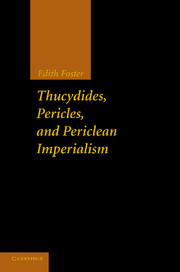Book contents
- Frontmatter
- Contents
- Acknowledgments
- List of Abbreviations
- Introduction
- 1 War Materials and Their Glory in the Archaeology
- 2 Arms and Passion
- 3 The Athenian Acme in Book One of Thucydides
- 4 Pericles in History
- 5 Pericles and Athens
- 6 Thucydides and Pericles' Final Speeches
- Bibliography
- General Index
- Index Locorum
3 - The Athenian Acme in Book One of Thucydides
The Spartan War Congress and the Pentekontaetia
Published online by Cambridge University Press: 06 July 2010
- Frontmatter
- Contents
- Acknowledgments
- List of Abbreviations
- Introduction
- 1 War Materials and Their Glory in the Archaeology
- 2 Arms and Passion
- 3 The Athenian Acme in Book One of Thucydides
- 4 Pericles in History
- 5 Pericles and Athens
- 6 Thucydides and Pericles' Final Speeches
- Bibliography
- General Index
- Index Locorum
Summary
In Chapter 2, we saw that Corcyra's acme of wealth and war materials was a root cause of the war between Corcyra and Corinth. This chapter continues to discuss the narrative setting of the war, and will focus on the representation of Athens' corresponding acme of wealth and war materials in Thucydides' accounts of the Spartan War Congress (1.68–88) and the Pentekontaetia (1.89–118), Thucydides' history of the fifty years between the Persian and Peloponnesian Wars.
Thucydides records four of the speeches held at the Spartan War Congress in 432: the speeches of the Corinthians, Athenians, and of two named Spartan speakers, Archidamus, King of Sparta, and Sthenelaidas, a Spartan ephor. For each of these speeches, the Athenian acme is an important topic.
For example, both the Corinthians and the Athenians argue that human beings are subject to the desire for rule and the drive to acquisition that produce accumulations of wealth and war materials. The Corinthians once again suppress mention of their own imperial practices and try to limit this trait to the Athenians, arguing that it is an aspect of the Athenian character. By contrast, the Athenians argue that the drive to empire is characteristic of all human beings, who necessarily seek their own advantage (1.76.2). Their speech aims to deter a Spartan attack, and they do not hide but rather advertise their war materials and military power.
Archidamus, King of Sparta, does not directly comment on the Athenian view that acquisitive behavior is inevitable.
- Type
- Chapter
- Information
- Thucydides, Pericles, and Periclean Imperialism , pp. 80 - 118Publisher: Cambridge University PressPrint publication year: 2010



